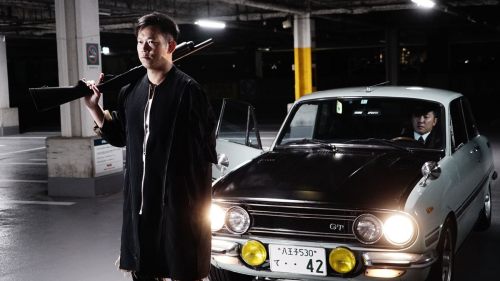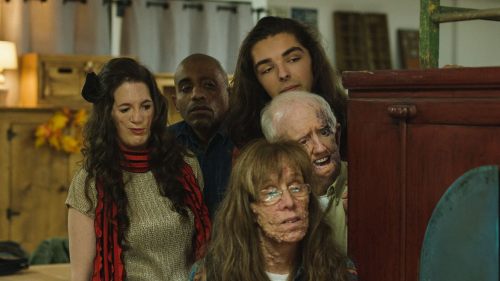Fantastic Fest Review: DIE KINDER DER TOTEN
Back in film school, we once had a fun assignment where we were given film clips stripped of all their sound, and our job was to recreate it to the best of our abilities. I lucked out and got Night of the Living Dead (specifically, the scene where Ben and Tom exit the house, jump in the truck, and drive over to the pump on their disastrous gas-getting mission), and while I did OK as far as the basics go, I wasn't skilled enough as a mixer to make any of it sound natural. I had the sound of a door shutting when they shut the door on screen, but it was clearly "off"; no one on the planet would think it was the original audio.
That exercise came to mind a lot during Die Kinder Der Toten, an Austrian zombie movie that has a couple of nods to George Romero's classic, because the film was shot without sound and had all of its audio added later - and they did about as good of a job as I did. Unlike a traditional silent film, which usually only has music added, the filmmakers added sound effects for a lot of what we see on-screen - crowd murmurs, cars revving their engines, the squishing of a food item (or body part), and so on, and it all has that same unnatural tinniness that my film school assignment had. Of course, my project was about four minutes long and was set to a scene we all knew - watching an entirely new movie like that is not going to be for everyone, and I must admit the experiment's appeal wore off long before it reached its end.
The film is based on the same-named "unfilmable" book (the title translates to "The Children of the Dead") by Elfriede Jelinek, but in keeping with the experimental theme, directors Kelly Copper and Pavol Liska said they haven't actually read it (perhaps they can't; despite being published in 1995, it's never been completely translated into English). Instead, they based their script on a few plot summaries they read, using Super 8 film and amateur actors to bring the story to life in a most unusual way. As with old silent films, you'll see someone talking before a card comes up with their dialogue written out, but they occasionally employ the same device to tell you what's going on, such as one when a woman is being chased a doppelganger. They also use this and other occasions to make humorous observations about their own action (in this instance, they point out how slow the "chase" is and how "driving music might convey a sense of urgency"), a gimmick that they perhaps should have leaned on more for it to really stick.
This along with the awkward sound design almost makes the movie feel like they actually found this silent footage in a closet somewhere and cobbled a narrative out of it, which would be an amusing experiment as well. But alas, the approach, while interesting and occasionally quite comical, doesn't sustain itself for a full 90 minutes - the effect wears off and you're left with a "zombie movie" full of bizarre tonal shifts, awkward acting, and... well, Nazis. The book apparently draws strong parallels to Austria's ugly history with the real world monsters, as well as the author's thoughts on the country's decline (the zombies first appear as a result of car accidents on their crumbling roadways, from what I understand), but the film jumps around between too many characters for any such metaphor to really come across. Maybe native Austrians will see those connections, but to the layman it's just a few random Nazi zombies showing up in the same movie that features grown women slapping each other with fish and an extended scene where a man repeatedly refers to zombies as "Zombs", confusing everyone he's addressing.
Ultimately, I think your enjoyment will depend mostly on your patience level. The unique approach certainly helps set it apart from a million other zombie films, and the hazy plotting makes it nearly impossible to ever have that "OK, I know what will happen next" feeling you get from so many others, so it's not a total loss. But while I am incredibly amused by the idea of filmmakers making a movie based on a book they never read, that isn't something that is apparent in the film itself, and you can't recommend a movie based on its behind the scenes trivia. As the filmmakers don't seem particularly interested in their narrative or characters (it's definitely a "style over substance" kind of deal here), it will play best to those who don't tire as easily from gimmickry - everyone else should satisfy themselves with a 5-10 minute chunk just to appreciate its unique presentation, then use that saved time to watch something they might scratch more than that one itch.



